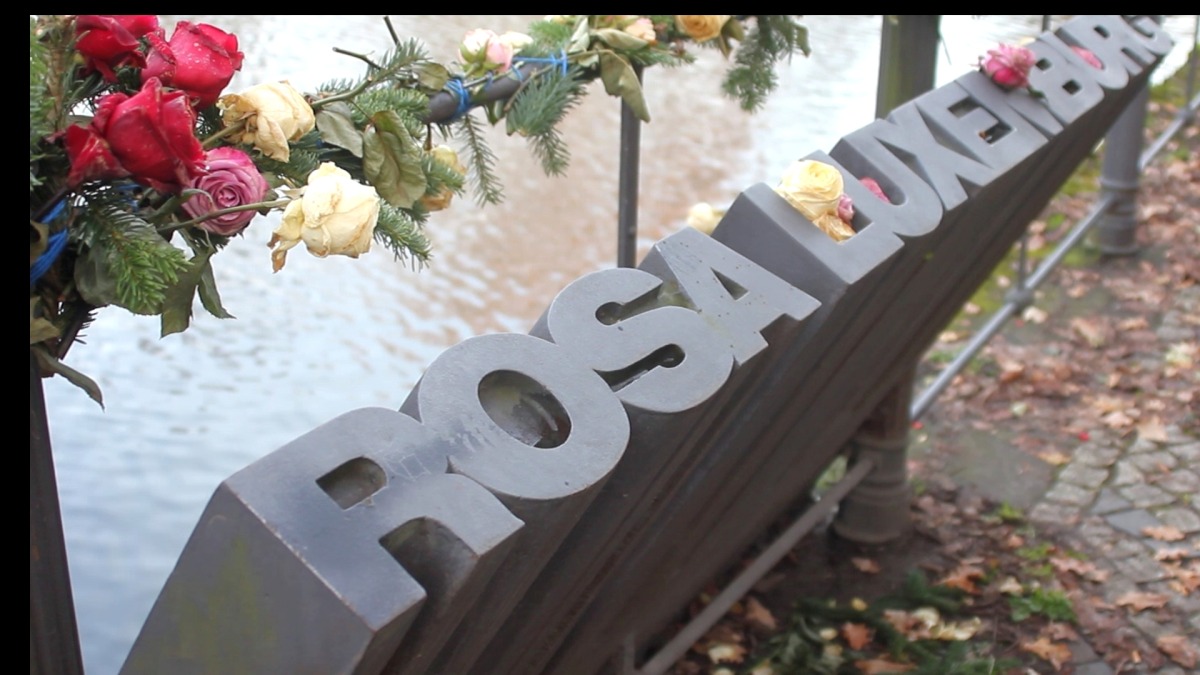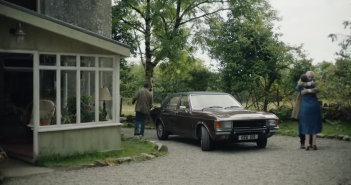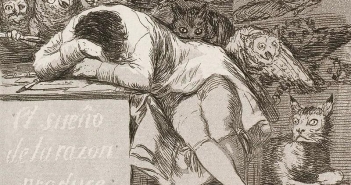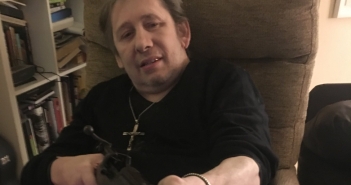To celebrate International Women’s Week, The New Theatre is presenting ‘Feathers for Rosa’ by Noël O’Callaghan and Douglas Henderson—an unusual tribute to Rosa Luxemburg. Centring on the poem ‘Du liegst | You lie’ by German-Jewish poet Paul Celan, it consists of a thirty-minute performance interspersed by three original songs. There is also an exhibition of paintings, an installation of a basket of white feathers from the Berlin canal swans, and a nine-minute experimental film and music video.
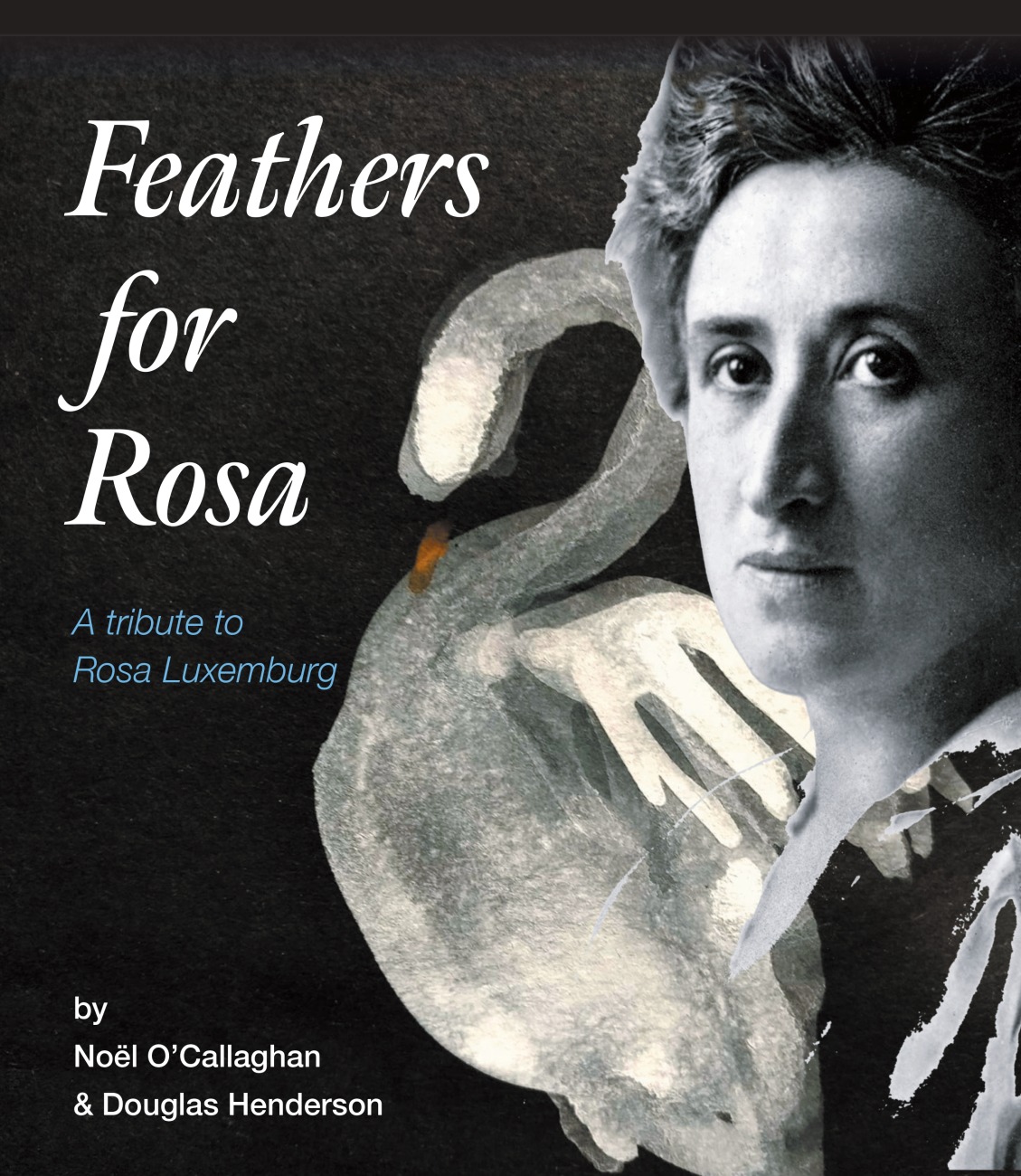
The following dialogue is based on the film script: Speakers are Noël (N) and Douglas (D).
N: I was once chased by an angry swan twice my size…
Years and years of painting swans… this flock lives on the banks of the Berlin canal—the same waterway where the body of Rosa Luxemburg was thrown on January 15th, 1919 and lay for four months undiscovered…or was it?
Did the swans floating above, perhaps the ancestors of this flock, discover it under the ice?
Did the moorhens and ducks spread the news up and down the banks… there’s something in the weeds… something in the weeds… something’s caught.
One day, he brought a poem into the studio…to set to music. It was called ‘Du liegst – You lie’ a poem by Paul Celan… about the murder… and about the body in the canal.
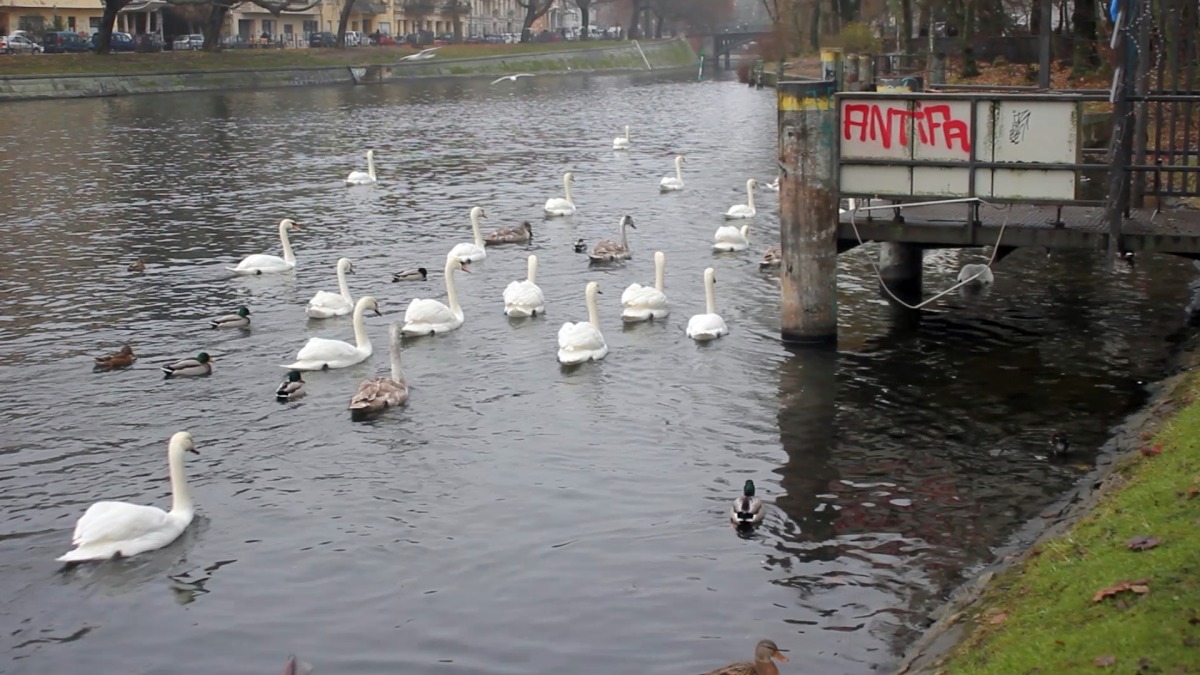
The Flock.
D: I found this poem in an email from my friend Alex. Its vividness and incantational drive seemed to drag me along in its wake. I was a bit surprised, since I associated this German-Jewish poet with poetry of the Holocaust and thought of him as somewhat impenetrable. Had complexity and interpretation veiled an evidently deep political commitment? Could it make a song?
Du liegst im großen gelausche, umbuscht, umflockt
You lie in the great listening, ambushed, flaked round
N. A strange and powerful song emerged and, as we played it night after night, a vision projected itself onto the dark, studio walls… a drowned Luxemburg, disembodied, upside-down, surrounded, Ophelia-like by bushes and waterbirds (umbuscht, umflockt), manifested itself as a sort of stained-glass window… and I made the painting ‘Du liegst’. Was I thinking of Harry Clarke? Yes, I think Rosa should have a stain-glass window. Was I also thinking of Millais’s Pre-Raphaelite Ophelia or of Georg Basiliz’s upside-down portraits?
D: The poem is a retelling of the brutal murder of Rosa Luxemburg and her political ally Karl Liebknecht… at times mimicking the sadistic language of her killers…Rosa’s body thrown into the Landwehr Canal… her political ally, Karl Liebknecht, riddled with bullets in the Tiergarten…
der man ward zum Sieb, die Frau müßte schwimmen, die Sau
the man became a sieve, the woman had to swim, the pig
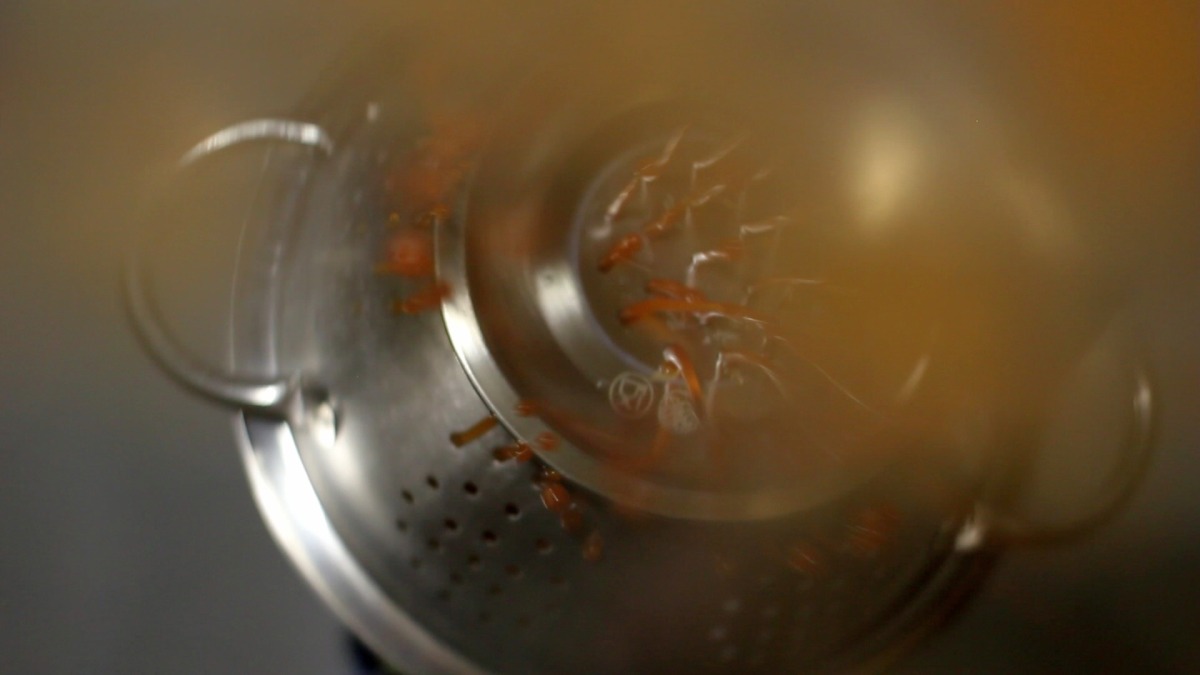
Sieve – screen grab from film.
N: The poem is also an account of Celan’s last trip to Berlin just before Christmas 1967…the city in a state of political turmoil following the murder by police of the student Benno Ohnesorg during protests against the visit of the Shah of Iran. During his visit, Celan walked the banks of the Spree and Havel rivers and along the Landwehr Canal past the site of Luxemburg’s death. Further along the canal from here you reach the Hercules Bridge, and in a park nearby, there’s a statue of Hercules fighting a boar… a pig.
geh zu den Fleischerhaken,
zu den roten Äppelstaken
go to the meat hooks,
to the red apple candlesticks from Sweden
… the Nazi meat-hooks of Plötzensee prison, the Fleischerhaken… the apple candlesticks from Sweden seen by Celan at a Christmas market in Berlin, the Äppelstaken.
Es kommt der Tisch mit den Gaben
er biegt um ein Eden
Here comes the gift-laden table,
it turns around an Eden
…Hotel Eden, where Luxemburg was held and tortured before her murder.
D: Candles were important for the Roman Saturnalia, the feast of Saturn, the precursor of Christmas. Hercules offered candles to Saturn in place of human sacrifices…honouring Saturn’s altar not by slaughtering a man, but by kindling lights… Sweden – the refuge of Willy Brandt, the architect of détente in Europe, who once said peace isn’t everything, but nothing is possible without it.
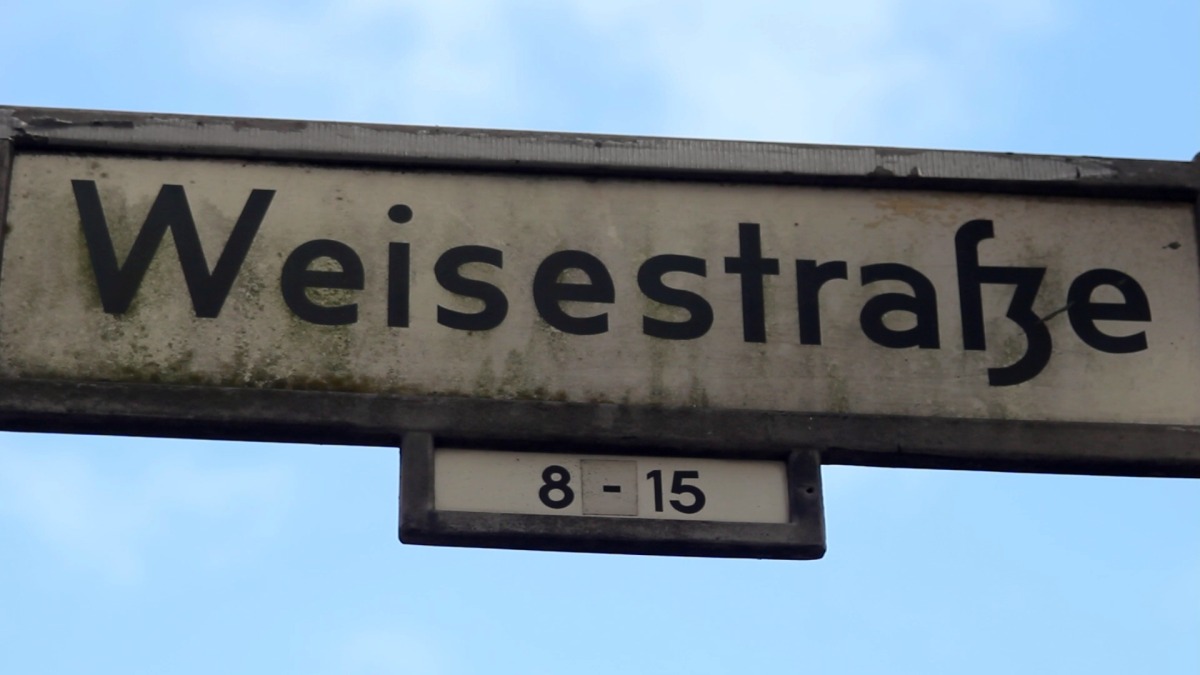
N: Weisestraße in the Neukölln district of Berlin is a ten-minute walk from where we’ve both lived for many years. It’s a typical street for this area… many apartment buildings dating from the end of the 1800s… really nothing to distinguish it from other similar streets in the area… nothing that alerts you to the weight of history. It was here at house number 8 that Rosa Luxemburg, together with her political ally Karl Liebknecht, spent some of their last days before their brutal murder… hiding from fascist militias in the apartment of supporters. Here they held political meetings to discuss the failed January uprising, even read bedtime-stories to their hosts’ children, until, fearing discovery, they had to leave…
D: We did some filming there one day in late December. There was a police raid on a nearby café because of an Instagram post supporting left-wing Palestinian resistance. We met some activists from the feminist anti-capitalist Zora collective who had been targeted there. They asked about our project and were delighted to hear that their name would be travelling to Ireland.
N: Banks of feathers like snow (umflockt)… I started collecting them… apropos of nothing, really, other than their beauty… then thoughts of Emmeline Pankhurst intruded. Her hateful White Feather campaign to send men to their deaths in World War 1. To turn a thing of such beauty into shame… it’s evil. Luxemburg was so different. She urged soldiers to lay down their weapons, to desert… and to know their real enemy. She paid for this with her life…
für sich, für keinen, für jeden
for herself, for no one, for everyone
The time has come to reclaim the White feather, to honour the Deserter…
‘I see them walking,
walking back,
back from the front,
The walking wounded,
The walking dead.’
(from Woman of the Rubble’s speech – ‘Feathers for Rosa’ performance).
Der Landwehrkanal wird nicht rauschen
Nichts
stockt.
The Landwehr Canal won’t rush.
Nothing
stops.
‘Feathers for Rosa’ is funded by donations through our gofundme campaign. Donors receive original watercolour sketches of swans made on the banks of the Landwehr Canal.

